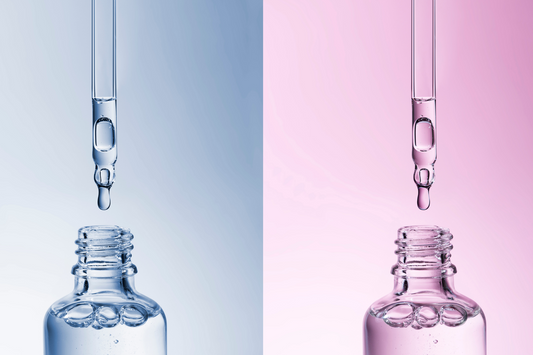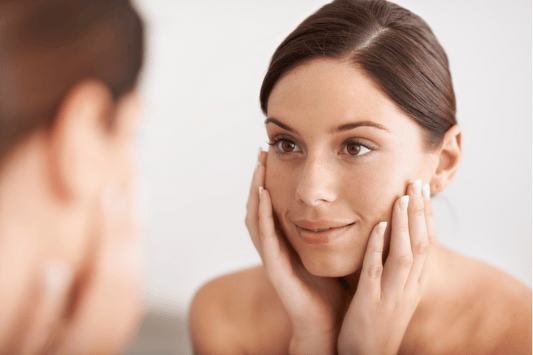In skincare and haircare products, it seems like there’s constantly a hot new ingredient making the rounds for one reason or another. We’ve covered ingredients like propylene glycol, dove into nutraceuticals and dietary supplements, but let’s talk about a new one here: Dimethicone. What is dimethicone, what products contain it, and why is it controversial? Does dimethicone contribute to hair loss? We’ll break down all the details here.
What is dimethicone?
Dimethicone, also known as polydimethylsiloxane (PDMS), is a polymer that falls into the category of compounds known as silicones. As a class of compounds, silicones like dimethicone have a variety of useful properties, including:
- Flexibility
- Resistance to moisture
- Low chemical reactivity
- Resilience to extreme temperatures
- Resistance to UV radiation
- Biocompatibility
- Low thermal conductivity
- Electrical insulation
Given those properties, silicones like dimethicone find themselves used in many different industries and in numerous consumer products. In household products, silicones like dimethicone are often used in cooking utensils like spatulas. If you’ve ever had a mold of your teeth taken at the dentist, a silicone mixture was likely used to make an impression mold of your teeth.
How is dimethicone used in beauty products?
In particular, dimethicone is used in consumer beauty products because of its properties as a surfactant—a detergent, like in a shampoo—and as a moisturizer. With beneficial properties like these, it would seem surprising if shampoos and conditioners that aimed to improve the quality of hair with dimethicone contributed to hair thinning and hair loss.
In hair care products
When used in hair care products, silicones like dimethicone serve as conditioners that help to control frizz and limit tangling. Different types of silicones—water soluble, non-soluble, and evaporating—all serve a similar role in conditioning the hair cuticle, with their primary difference being in how the product can be removed from the hair strand itself. Water soluble silicones, like dimethicone copolyol and PEG-8 dimethicone, can be removed in the shower with a normal rinse. The PEG portion of the compound, short for polyethylene glycol, helps dimethicone to dissolve in water.
Though dimethicone can help hair cuticles to retain the moisture they already possess, the protective barrier has a downside: With continued use, the compound can accumulate on the hair cuticle and prevent moisture from penetrating into the hair strand. In lighter, less robust hair, the buildup of silicones like dimethicone can tend to weigh down the hair strands, leading to an apparent reduction in overall volume. If that barrier starts to lock out moisture from the hair cuticle, dimethicone hair loss is possible. If you find that continued use of dimethicone hair products is weighing down your strands, a specific cleanser can be used every few weeks in order to remove the silicone buildup and comfort any concerns you may have about potential dimethicone hair loss.
Though this may contribute to hair breakage and the appearance of thinning hair, this can be avoided with proper usage. When used as directed, dimethicone is not considered to be a contributor to hair loss.
In skincare products
In skincare products, dimethicone’s slipperiness is used to make it easier for lotions and other products to spread evenly on the skin. Because of its ability to both repel and seal in moisture, it forms a protective barrier that keeps skin hydrated. Silicones like dimethicone are also useful as a vehicle for delivering useful medicines and drugs across the surface of the skin and can help those patches adhere more effectively.
In treating head lice
At higher concentrations, dimethicone has been shown to be an effective ingredient at treating head lice. In a UK study, a 4% solution of dimethicone was found to be effective at killing head lice, a convenient benefit alongside its moisturizing properties. In the clinical study, no participants discontinued the treatment due to any discomfort or adverse effects.
In a study from the New York metropolitan area, 58 school-age participants found to have head lice were given a 100% solution of dimethicone as a shampoo by the school nurse. At entry into the study, 55 children had viable eggs and 3 children had live lice; by day 14, 96.5% (55/57) of children remained free of live lice, while 80.7% (46/57) were free of viable eggs. Initially, 10 children showed scalp redness and 8 showed scalp irritation, while by the end of the study, only 1 child showed scalp redness and none showed scalp irritation.
Should I be using beauty products containing dimethicone?
As we’ve mentioned, consistent use of dimethicone products to defrizz and detangle your hair can allow for buildup that is best removed with occasional use of a silicone-free cleanser. If buildup becomes substantial, it may be possible that the hair cuticle dries out to a degree that breakage and other damage could occur; however, proper use of any product containing dimethicone can limit such a risk and avoid any unnecessary hair thinning or hair loss that could occur.
When it comes to toxicity or absorption, the Cosmetic Ingredient Review Panel determined that, due to dimethicone’s large molecular weight and the low concentrations of dimethicone used in cosmetic products, absorption of the compound through the skin was unlikely to occur. This property makes dimethicone not only a useful moisturizer, but a useful vehicle for the delivery of active ingredients across the skin, with silicones like cyclomethicone and dimethicone being used in more than 350 registered drugs. It’s reassuring to know that dimethicone-based products won’t see dimethicone itself absorbed through the skin, and that dimethicone hair loss won’t be caused by toxicity or chemical absorption.
Recap
Silicones like dimethicone are well-understood compounds that are widely used in many industries, including the haircare and skincare industries. Though improper usage of haircare products containing dimethicone can result in dryness and breakage, there are a variety of different types of products that can address those shortcomings. When used properly, dimethicone can help to moisturize, condition, and enrich your hair without contributing to hair loss. What better way to amp up your fuller, healthier hair alongside our Hair Revival Serum?




